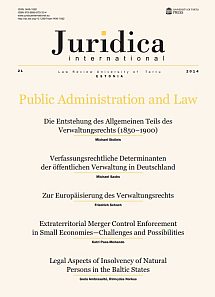The Buyer’s Right to Require Reimbursement for Repair Costs of Defective Goods under the CISG, the CESL, and Estonian Law
DOI:
https://doi.org/10.12697/JI.2014.21.13Keywords:
CISG, CESL, LOA, sales law, buyer’s remedies, defective goods, compensation for damages, claim for performanceAbstract
The analysis compares the conditions under which the buyer’s right to require reimbursement for repair costs arises under the terms of the CISG, the CESL and the Estonian sales law. The authors present a hypothesis that the institution of cure and that of granting of additional time differ fundamentally in how they function in balancing the interests of the seller and buyer. Cure prioritises the buyer’s interests and leaves the risk of communication to be borne by the seller. The institute of granting additional time, in contrast, gives priority to a claim for performance, and shifting from this claim to a claim for repair costs usually requires prior active intervention by the buyer.
According to the authors, the logic of the institution of cure should be preferred in balancing of the interests of the seller and buyer. The buyer, as the party who delivered the defective goods, should bear the risk of communication and active intervention related to the remedying of a defect. In the case of passivity or inadequacy of measures, the seller knowingly risks having to provide reimbursement for repair costs.


